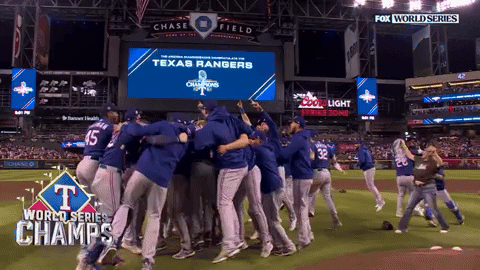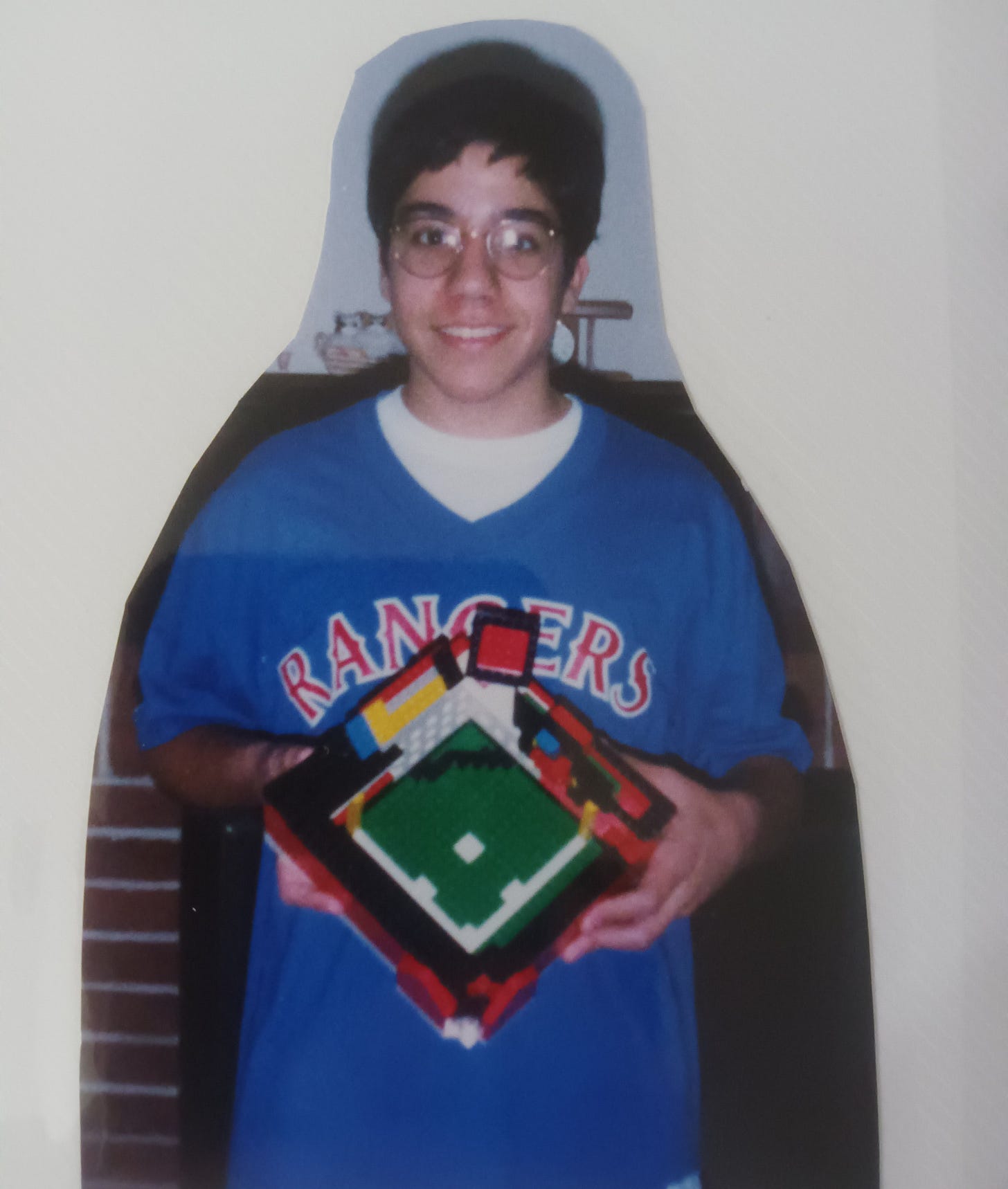The final strike
The Texas Rangers are, at long last, World Series champions. The painful wait made it that much sweeter.
I've been waiting 30 years for this. And yet, I still can’t fully grasp that my favorite baseball team since childhood, the Rangers, finally won the World Series.
I've been so used to the bottom dropping out, of losing painfully, that it hurt too much to consider the possibility of the team winning it all.
When pitcher Josh Sborz got his second strike against the Diamondbacks' Ketel Marte in the ninth inning of Game 5 on Wednesday, and the Rangers were one strike away ... whoo boy. They were up 5-0 and in complete command and I still couldn't believe this was actually real. They'd been this close before, only to see the championship snatched away.
The tough times stick with you. And for a lot of my fandom, the Rangers have felt tortured.
I didn't recognize that, of course, when I became a Rangers fan in 1993. I was 9 years old and drawn in by ageless pitcher Nolan Ryan and young stars like Juan Gonzalez and Ivan "Pudge" Rodriguez.
The fact that I grew up in central Pennsylvania only isolated me further. It was Phillies and Orioles country, and here I was, rooting for the Texas Rangers?!
It took until 1996, the franchise's 36th season — 11 in Washington and another 25 in Texas — to reach the playoffs for the first time. Division titles followed in 1998 and 1999.
But each time, they ran into a Yankees buzzsaw. They couldn't compete. The Bronx Bombers were historically great, complete teams, and playing at another level.
Years of futility followed. I got used to my team being bad. They scored and gave up lots of runs. Pitchers didn't want to play there. Free-agent signings and trades backfired.
My team kept losing year after year.
Then 2010 happened, when the Rangers extinguished the dreaded Yankees in the ALCS to win their first pennant. While Texas fell short in the World Series, it felt great to reach that next level.
When they made it back the following season — a tough task, given the postseason’s random, streaky nature — it was time to make that final step.
To get the final strike.
The final out.
But the Cardinals and David Freese didn't get the memo.
Getting within one strike, only to come up empty, was all stick and no carrot. Every single thing lined up for a Rangers championship except for the outcome. That loss made Rangers fandom historically painful. Freese became shorthand for Buckner and Dent and Bartman and Boone and Joe Carter, moments that meant joy victory for one team and pure heartbreak for another.
Over the ensuing seasons, the World Series teams were ripped apart piece by piece. October collapses and Jose Bautista bat flips gave way for my yearly ritual of rooting for the ex-Rangers with other teams in the Fall Classic — Mike Napoli and Mitch Moreland and Asdrúbal Cabrera and Ron Washington ...
It became increasingly painful as other teams won. The Astros — for half a century a Rangers counterpart in misery — became a premiere franchise, winning two rings. The Cubs and White Sox and Red Sox all broke their long October droughts. The Dodgers broke their 32-year dry spell in 2020 at the Rangers’ ballpark, Globe Life Field, of all places, due to the COVID-19 pandemic.
Even though their home ballpark hosted a World Series, the Rangers kept on losing. Only the Phillies (77 seasons) and St. Louis Browns/Baltimore Orioles (63) had a longer existence without winning their first championship.
Over the past few seasons, the Rangers spent big to bring in major free agents like Corey Seager, Marcus Semien, Jon Gray, Jacob deGrom, and Nathan Eovaldi. But they'd spent big before on free-agents like Alex Rodriguez, Chan Ho Park and Prince Fielder, only to get burned. You can't buy your way to winning, but money — if spent wisely — can help get you closer.
The pieces started really falling into place under current GM Chris Young, a former Rangers pitcher.
Possibly the biggest addition came a year ago when the Rangers announced the hire of manager Bruce Bochy. Bochy is a proven winner, someone who guided the Giants to three championships (the first against the Rangers in 2010). He is also someone I'd spent a decade studying and appreciating for my book about his former player with the Padres, Ken Caminiti.
I gained so much respect for the way Bochy handled his teams and got the best out of his players (one of whom was Young for the 2006 Padres).
I interviewed Bochy in 2020. At the time, he didn't have a team to manage after leaving San Francisco the season before. Instead of going through the Giants media relations team, like I'd tried unsuccessfully in seasons prior, I pulled some phone numbers from online databases associated with Bochy and (gulp) called them.
One of the numbers rang. No one answered. I left a message. I saved the number in my phone: Bochy? I had no idea if my message would ever reach the manager.
A week or two later, I received a call from Bochy? Was it a wrong number? Or the man himself?
I answered the call, not knowing what to expect, and there, in my ear, was the gravelly-voiced manager.
We spoke in full a few days later. Bochy was engaging and helpful and thoughtful.
At the time, I was struck by his comments about managing and his inner drive. He didn't use the term "retired" when discussing his managerial career, but "pause button." He was still interested in managing again.
Losing the 1998 World Series had fueled him — but even after winning three rings with the Giants, he wanted one more chance.
"It just made me so hungry to want to get back, have one more shot, and so 2010, that happened. And so you think, 'OK, I did it,' but then you want to win another one because you heard you were lucky. So you want to validate the first one, and so we won the second one, and now it gets you even hungrier to even do it again. And even after '14, after three, I wanted one more shot. It's like an adrenaline drug. There's nothing like it," he told me.
He wasn't content with his three World Series wins.
Somebody of Bochy's stature had the chance to call his shot and pick the right environment for him. He wasn't going to just sign with any team with an opening. He would have to choose a place with a winning culture and a commitment to old-school and new-school baseball methodologies.
A team that would let him manage his way.
You don't hire Bruce Bochy to change him; you hire Bruce Bochy so he can turn your team into a winner.
My team hired the manager I trusted and respected the most, and was building a strong roster; but again, there were so many unknowns of how the experiment would turn out and a franchise history full of coming up short.
I’d gotten my hopes up too many times before.
The Rangers started the 2023 season at a blistering pace. Through the season's first 50 games, Texas was 32-18 and pounding opponents — their run differential (+122) put them on a historic trajectory.
But then came the downturn. The high-priced, high-performance team had a vulnerability, an Achilles heel — their bullpen was putrid.
Without a good bullpen, it's really tough to win.
The bats went cold for stretches, too. deGrom was lost for the season and other key players missed chunks of time with injury.
The Rangers stocked up on arms at the trade deadline, picking up Jordan Montgomery and Max Scherzer. But for a while, nothing seemed to be working. An August and September swoon made an early playoff exit seem all but inevitable (again).
Hope seemed lost (again).
I was ready to count them out (again).
To have my heart broken (again).
I started looking to next year (again).
But unlike previous Rangers squads, this team had some magic left. All of the letdowns and disappointments had made them resilient. They went into October with something to prove, and they gelled at the perfect time.
And this time around, they had one of the best in-game managers calling the shots.
They breezed through Tampa Bay, slammed their way past Baltimore, and squeaked past their division and in-state rival, Houston, in a gripping, dramatic seven-game series.
And then it was on to the World Series to face ... Arizona? It was the unlikeliest of matchups. I was expecting Atlanta, Los Angeles or Philadelphia to win the National League crown, but the D-backs were chasing their own October magic, which made them especially scary.
Even after the Rangers reached the World Series and stole Game 1 with clutch blasts by Seager and superhuman slugger Adolis Garcia, it was difficult for me to believe they might actually win this thing.
The Diamondbacks ran away with Game 2 to send the series tied back to Arizona, and the momentum seemed poised to swing back in Arizona’s favor.
The Rangers eked out a win in Game 3 and jumped out to a huge lead in Game 4, hanging on to take a 3-1 series lead.
Then came Game 5 on Wednesday, when the Rangers faced a magnificent Zac Gallen. Arizona’s ace didn't surrender a hit through six innings. It was the kind of performance that can shift an entire series.
Eovaldi was just as magnificent, stranding runners and getting out of jams in a sloppy but scoreless outing.
In the seventh inning, the Rangers finally got to Gallen. Seager squibbed a single to left for the Rangers' first hit, and Evan Carter, the rookie outfielder playing well beyond his years, followed with a double. DH Mitch Garver came up next and squirted a ball up the middle to break the scoreless tie.
The score remained 1-0 until the ninth, when Texas piled on, scoring four gargantuan insurance runs and breaking the game open.
The Rangers carried a five-run lead into the bottom of the ninth, and yet, I still couldn’t believe that the game was in hand. I was too used to seeing Rangers seasons end in soul-crushing ways. They were perpetually one strike, one player, one season, one arm or one bat away.
That was the case until the third and final strike settled into catcher Jonah Heim's mitt.
In that moment, the years of frustrations and emptiness, of wishing and wondering, washed away. The Texas Rangers are, at long last, World Series champions. The painful wait made it that much sweeter.



